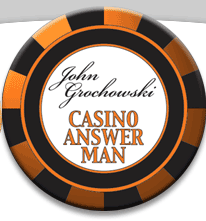Answer. I doubt that half of blackjack players in casinos have studied a basic strategy chart, let alone count cards. I'd put the number of card counters at less than 1 percent of the blackjack-playing population.
Before any player who is trying to get better worries about counting cards, he or she must master basic strategy first. An average blackjack player faces a house edge of about 2 to 2.5 percent. Learning basic strategy can cut that house edge to around a half percent or less, depending on house rules.
How can you tell if someone at your table is a basic strategy player? Here are a few common moves that separate those who know their basic from those who don't:, assuming a multiple-deck game.
- A basic strategy player hits hard 16 when the dealer shows a 7. Every time.
- A basic strategy player splits Aces, and splits 8s, even when the dealer has a 10 face up. Exception: The basic strategy player will surrender on 8-8 if the dealer hits soft 17 and surrender is offered.
- A basic strategy player never stands on soft 17. He or she hits or doubles down, depending on the dealer's face up card.
- A basic strategy player hits on 12 if the dealer shows a 2 or a 3.
- A basic strategy player hits on soft 18 if the dealer shows a 9, 10 or Ace.
Card counters will sometimes make plays that run counter to basic strategy. In addition to hitting 12 against a 2 or 3, a counter will sometimes also hit 12 against 4, if the composition of the remaining cards is right. A card counter also will sometimes hit 16 against 10, but not 16 vs. 7.
Insurance is a special case. Intuition players often will insure their blackjacks by taking even money when the dealer has an Ace face up. Basic strategy players will never take insurance --- that's the right play most of the time. Card counters, on the other hand, will take insurance if the remaining deck includes a high enough percentage of high cards.
Look around next time you play. See how many players hem, haw and sometimes stand on 16 vs. 7, or fail to split 8s against a 10, or stand on Ace-7 against a 9. That'll tell you just how few basic strategy players there are --- and there are many, many few card counters.
Question. I would like to know if adding say $1,000 to a slot machine loosens that machine for a big payout.
Also, I always play the max. Does it matter what the denomination of the game is? That is, do the games loosen as the denomination rises? Does a $1 game pay more than a penny slot played at maximum?
Answer. No amount of play changes the odds of hitting a winning combination on slot machines. If the game is programmed so that there is a 1 in 10,000 chance of hitting the big jackpot, then there is a 1 in 10,000 chance on every spin. If you've just hit the jackpot, the odds are still in 1 in 10,000; if you've played 9,999 spins without hitting the big jackpot, the odds are STILL 1 in 10,000.
(The 1 in 10,000 is just an example, by the way. Some machines hit more frequently, some much less. There are machines with a 1 in 2,000 chance of hitting the top jackpot, while in a big-money game like Megabucks the chances are 1 in tens of millions.)
If it's a progressive machine, adding money to the top jackpot does not change the odds of your hitting that jackpot. If the progressive meter starts at $1,000, and the jackpot meter has grown to $2,000, the chances of winning are the same as when you started. The long-term payback percentage does grow with the progressive meter, because the big hit pays more when it finally comes.
As for changing coin denomination, that DOES make a difference. Generally, penny machines pay less than nickel machines, which pay less than quarters, which pay less than dollars and so on. If you play maximum coins on a penny machine, your bet may be as large as if you're playing a three-reel dollar slot, but in most cases the dollar game will have a higher payback percentage.
Of course, there's also a difference in the play experience between a penny video slot and a dollar reel-spinner. Winning spins are more frequent on the video game, but payoffs of many times your wager are more common on the reel-spinner. The penny game will keep you in your seat longer, but the dollar game gives you a better chance of walking away with a fairly substantial win. That's the choice slot players face when deciding between low-denomination video games and higher denomination reel spinners.

Sir: Could you please tell me what the house edge is in Blackjack if the player only draws if he has an eleven or less. No draw under any other circumstances.
ReplyDeleteA never-bust strategy has a house edge of about 4 percent. It can be a few tenths of a percent more or less depending on house rules. That's a far larger house edge than the half-percent or so you face if you learn basic strategy.
Delete